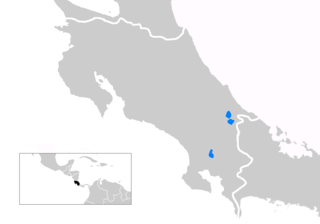| Bribri | |
|---|---|
| Talamanca | |
| Native to | Costa Rica. |
| Region | Limón province: Talamanca cantón, along Lari, Telire, and Uren rivers; Puntarenas province: Buenos Aires cantón |
| Ethnicity | 12,200 Bribri (2000)[1] |
Native speakers | 7,000 (2011)[1] |
| Official status | |
Recognised minority language in | Costa Rica |
| Language codes | |
| ISO 639-3 | bzd |
| Glottolog | brib1243 |
| ELP | Bribri |
 | |

Bribri, also known as Bri-bri, Bribriwak, and Bribri-wak, is a Chibchan language, from a language family indigenous to the Isthmo-Colombian Area, which extends from eastern Honduras to northern Colombia and includes populations of those countries as well as Nicaragua, Costa Rica, and Panama. As of 2002, there were about 11,000 speakers left.[2] An estimate by the National Census of Costa Rica in 2011 found that Bribri is currently spoken by 54.7% of the 12,785 Bribri people, about 7,000 individuals.[3] It is a tonal language whose word order is subject–object–verb.
There are three traditional dialects of Bribri: Coroma (in the western region of the Talamanca mountain range), Amubre (in the eastern region of the Talamanca mountain range) and Salitre (in the South Pacific area). Bribri is a tribal name, deriving from a word for "mountainous" in their own language. The Bribri language is also referred to as Su Uhtuk, which means "our language."[4] Bribri is reportedly most similar to sister language Cabécar as both languages have nasal harmony, but they are mutually unintelligible.[5]
- ^ a b Bribri at Ethnologue (18th ed., 2015) (subscription required)
- ^ "Ethnologue". Archived from the original on 28 June 2011. Retrieved 22 February 2011.
- ^ "Vista de Morfología verbal de la lengua bribri". revistas.ucr.ac.cr. Retrieved 2020-01-29.
- ^ "Bribri Language and the Bribri Indian Tribe (Bri-Bri, Talamanca, Coroma)". www.native-languages.org. Retrieved 2020-01-29.
- ^ "Bribri". Ethnologue. Retrieved 2020-01-29.